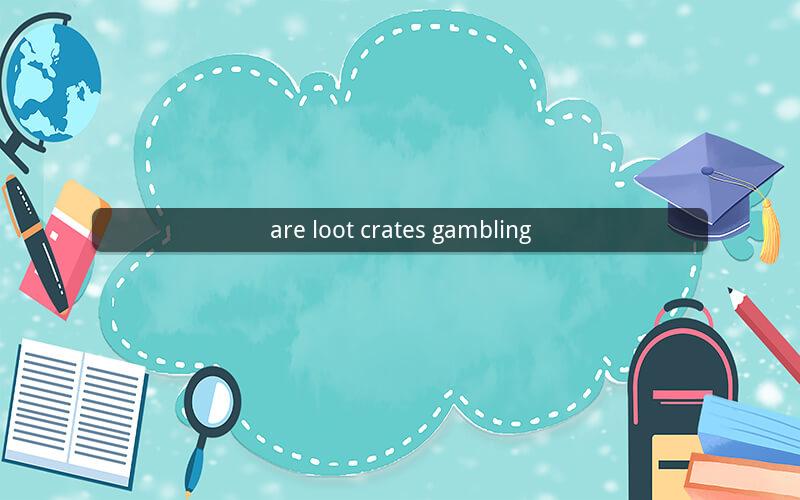
Are Loot Crates Gambling?
Table of Contents
1. Introduction to Loot Crates
2. Understanding the Concept of Gambling
3. The Role of Randomness in Loot Crates
4. Legal and Ethical Implications
5. Impact on Gamers and the Industry
6. Comparing Loot Crates to Traditional Lottery
7. The Psychological Aspect of Loot Crates
8. Conclusion
1. Introduction to Loot Crates
Loot crates have become an integral part of modern gaming culture, especially in multiplayer online games. These virtual containers offer players a chance to acquire in-game items, ranging from weapons and armor to skins and cosmetics. While many gamers enjoy the thrill of opening loot crates, there is a growing debate regarding whether they constitute gambling.
2. Understanding the Concept of Gambling
Gambling involves risking something of value on an event with an uncertain outcome. It can be categorized into two types: skill-based and chance-based gambling. While some forms of gambling require a certain level of skill, most rely heavily on luck or chance. The key elements of gambling include the presence of a prize, the requirement of an entry fee, and the element of chance.
3. The Role of Randomness in Loot Crates
Loot crates operate on a system of randomness, with each crate containing a random selection of items. This randomness is what differentiates loot crates from traditional skill-based gaming, where the outcome is determined by the player's skill or strategy. However, the element of chance raises questions about whether loot crates should be classified as gambling.
4. Legal and Ethical Implications
The legal and ethical implications of loot crates as gambling vary by country and region. In some places, loot crates are considered legal, while in others, they are subject to strict regulations. Ethically, the debate centers on whether loot crates can be seen as a form of exploitation, as players may spend significant amounts of money on crates with uncertain returns.
5. Impact on Gamers and the Industry
Loot crates have had a significant impact on both gamers and the gaming industry. For gamers, the thrill of opening a crate and potentially obtaining rare items can be addictive. However, some players may develop gambling-like behaviors, such as spending excessive amounts of money on crates. For the industry, loot crates generate substantial revenue, but they also raise concerns about the potential for addiction and the need for responsible gaming practices.
6. Comparing Loot Crates to Traditional Lottery
Loot crates share some similarities with traditional lottery systems, such as the element of chance and the potential for significant returns. However, there are also key differences. Unlike lottery tickets, loot crates are often integrated into the game itself, making them more accessible to players. Additionally, loot crates can provide immediate in-game benefits, while lottery winnings are typically received later.
7. The Psychological Aspect of Loot Crates
The psychological aspect of loot crates is an area of growing interest. Studies have shown that the anticipation of opening a crate and the potential for obtaining rare items can trigger the release of dopamine in the brain, a neurotransmitter associated with pleasure and reward. This can create a psychological addiction, as players become increasingly driven by the desire to obtain valuable items.
8. Conclusion
While loot crates offer a unique experience for gamers, the question of whether they constitute gambling remains a contentious issue. The element of chance, along with the potential for addiction and ethical concerns, makes it a topic worth continued discussion. As the gaming industry evolves, it is essential for developers, players, and regulators to work together to ensure a safe and enjoyable gaming experience for all.
Questions and Answers
1. What is a loot crate?
A loot crate is a virtual container that offers players a chance to acquire in-game items through a system of randomness.
2. Is there a difference between loot crates and traditional lottery?
Yes, loot crates are often integrated into the game itself, making them more accessible to players, while lottery winnings are typically received later.
3. Can loot crates be considered gambling?
The classification of loot crates as gambling varies by country and region, but they do share some similarities with gambling, such as the element of chance and the potential for significant returns.
4. Are loot crates addictive?
Yes, studies have shown that the anticipation of opening a crate and the potential for obtaining rare items can trigger the release of dopamine in the brain, leading to addictive behavior.
5. What are the legal implications of loot crates?
The legal implications of loot crates vary by country and region, with some places considering them legal while others subject them to strict regulations.
6. How do loot crates affect the gaming industry?
Loot crates generate substantial revenue for the gaming industry, but they also raise concerns about addiction and the need for responsible gaming practices.
7. Can loot crates be seen as a form of exploitation?
Some argue that loot crates can be seen as a form of exploitation, as players may spend significant amounts of money on crates with uncertain returns.
8. Are there any ethical concerns regarding loot crates?
Yes, ethical concerns include the potential for addiction, the exploitation of players, and the need for responsible gaming practices.
9. How can developers address the concerns surrounding loot crates?
Developers can address concerns by implementing responsible gaming practices, such as age restrictions and spending limits, and ensuring transparency in the loot crate system.
10. Should governments regulate loot crates?
Whether or not governments should regulate loot crates is a matter of debate, but some argue that regulations are necessary to protect players from potential harm.